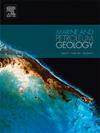泥岩成因随深度和热成熟度在仙人掌-都罗纪伊格尔福特组的变化。第二部分:成因过程和副成因序列
IF 3.7
2区 地球科学
Q1 GEOSCIENCES, MULTIDISCIPLINARY
引用次数: 0
摘要
新生代-震旦纪(C-T)伊格尔福特组(EFG)由块状、层状和/或钻孔状灰岩、泥灰岩和石灰质泥岩组成,沉积于风暴潮基底以下的得克萨斯州南部淹没大陆架上。埋藏成因调查使用了七口取芯井,从浅埋到深埋(深度范围从 7684 到 13,670 英尺 [2342 到 4166.6 米];BHT 从 183 到 285 °F [83.9-140.6 °C]),从东(圣马科斯拱门)到西(马弗里克盆地),描述了由于水化学、氧化还原条件和埋藏历史的变化而产生的复杂成因历史。这项综合研究的第二部分展示了成岩作用和副成岩作用的多样性。这项研究尤其侧重于富含有机质的下伊格尔福特(LEF)岩层,该岩层主要沉积于缺氧/缺氧条件下。近海底硫酸盐还原、铁还原和甲烷生成等过程推动了岩化过程中的各种化学反应。长石成岩作用包括白化和 K 长石向高岭石和白云石的转化,以及随着深度的增加从高岭石向镁绿泥石的转化。粘土矿物成因十分复杂,在生物群测试和基质中形成了自生高岭石、混合高岭石/镁绿泥石和镁绿泥石。此外,还观察到方解石溶解、埋藏白云石化、晚期铁绿泥石置换以及黄铁矿氧化成云母。在油窗中,来自残积岩的直闪石开始转变为混合层状粘土,即照明石-直闪石(I/S);但是,在深度上没有观察到照明化趋势。这是因为大多数直闪石是由火山灰蚀变形成的,而火山成因的定向直闪石并不遵循常规的析出动力学。镁含量的增加不仅使高岭石转变为绿泥石,还使自生白云石析出。粘土矿物沉淀在原来的颗粒间孔隙中,进一步降低了孔隙度,影响了渗透性、流体饱和度、润湿性和毛细管压力。随着热成熟,沥青和石油的转化增加了岩石的油润湿性,线性测井的电阻率测量值也随之增加。本文章由计算机程序翻译,如有差异,请以英文原文为准。
Mudstone diagenesis with depth and thermal maturity in the Cenomanian–Turonian Eagle Ford group. PART II: Diagenetic processes and paragenetic sequence
The Cenomanian–Turonian (C–T) Eagle Ford Group (EFG) is composed of massive, laminated, and/or burrowed limestones, marls, and lime mudstones deposited on the drowned south Texas shelf below storm-wave base. A burial diagenesis investigation using seven cored wells from shallow to deep burial (depth ranges from 7684 to 13,670 ft [2342 to 4166.6 m]; BHT from 183 to 285 °F [83.9–140.6 °C]) and from east (San Marcos Arch) to west (Maverick Basin) delineated a complex diagenetic history as a result of changes in water chemistry, redox condition, and burial history. The second part of this comprehensive study shows the variety of diagenesis and paragenesis. This study focuses especially in the organic-rich Lower Eagle Ford (LEF) member deposited largely under anoxic/euxinic conditions. Processes such as near seafloor sulfate-reduction, Fe-reduction, and methanogenesis drive various chemical reactions during lithification. Feldspar diagenesis included albitization and transformation of K-feldspar to kaolinite and albite, and from kaolinite to Mg-chlorite with depth. Clay mineral diagenesis is complex with authigenic kaolinite, mixed kaolinite/Mg-chlorite, and Mg-chlorite form in biota tests and matrix. Additionally, calcite dissolution, burial dolomitization, late Fe-chlorite replacement, and oxidation of pyrite to marcasite are also observed. Detritus-derived smectite starts to transform to mixed layered clay, illite-smectite (I/S) in the oil window; however, illitization trends were not observed in depth. This is because most smectite forms from alteration of volcanic ashes and the volcanic origin of the disorientated smectite did not follow regular illitization kinetics. The increase in Mg content from illitization transforms not only the kaolinite to chlorite, but precipitates authigenic dolomites. The clay minerals precipitated in the original interparticle pores, further reducing porosity, and impacted permeability, fluid saturation, wettability, and capillary pressure. With thermal maturation, bitumen and oil conversion increases oil-wetness of the rock and the resistivity measurement from wireline logs.
求助全文
通过发布文献求助,成功后即可免费获取论文全文。
去求助
来源期刊

Marine and Petroleum Geology
地学-地球科学综合
CiteScore
8.80
自引率
14.30%
发文量
475
审稿时长
63 days
期刊介绍:
Marine and Petroleum Geology is the pre-eminent international forum for the exchange of multidisciplinary concepts, interpretations and techniques for all concerned with marine and petroleum geology in industry, government and academia. Rapid bimonthly publication allows early communications of papers or short communications to the geoscience community.
Marine and Petroleum Geology is essential reading for geologists, geophysicists and explorationists in industry, government and academia working in the following areas: marine geology; basin analysis and evaluation; organic geochemistry; reserve/resource estimation; seismic stratigraphy; thermal models of basic evolution; sedimentary geology; continental margins; geophysical interpretation; structural geology/tectonics; formation evaluation techniques; well logging.
 求助内容:
求助内容: 应助结果提醒方式:
应助结果提醒方式:


